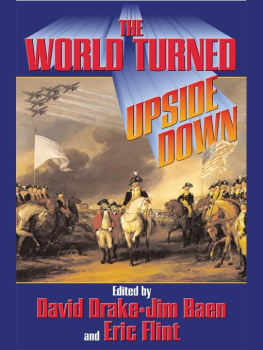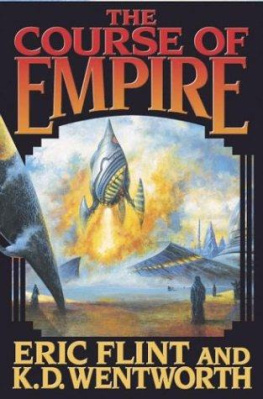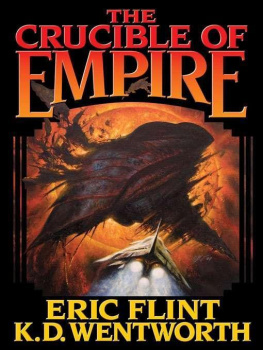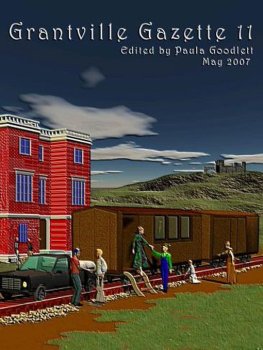Eric Flint - Grantville Gazette.Volume XVII
Here you can read online Eric Flint - Grantville Gazette.Volume XVII full text of the book (entire story) in english for free. Download pdf and epub, get meaning, cover and reviews about this ebook. genre: Science fiction. Description of the work, (preface) as well as reviews are available. Best literature library LitArk.com created for fans of good reading and offers a wide selection of genres:
Romance novel
Science fiction
Adventure
Detective
Science
History
Home and family
Prose
Art
Politics
Computer
Non-fiction
Religion
Business
Children
Humor
Choose a favorite category and find really read worthwhile books. Enjoy immersion in the world of imagination, feel the emotions of the characters or learn something new for yourself, make an fascinating discovery.

- Book:Grantville Gazette.Volume XVII
- Author:
- Genre:
- Rating:5 / 5
- Favourites:Add to favourites
- Your mark:
- 100
- 1
- 2
- 3
- 4
- 5
Grantville Gazette.Volume XVII: summary, description and annotation
We offer to read an annotation, description, summary or preface (depends on what the author of the book "Grantville Gazette.Volume XVII" wrote himself). If you haven't found the necessary information about the book — write in the comments, we will try to find it.
Grantville Gazette.Volume XVII — read online for free the complete book (whole text) full work
Below is the text of the book, divided by pages. System saving the place of the last page read, allows you to conveniently read the book "Grantville Gazette.Volume XVII" online for free, without having to search again every time where you left off. Put a bookmark, and you can go to the page where you finished reading at any time.
Font size:
Interval:
Bookmark:
Eric Flint
Grantville Gazette.Volume XVII
The Anaconda Project, Episode Five
Eric Flint
As he watched the archer bringing his horse around again for another run at the target, Lukasz Opalinski leaned toward the man standing next to him. "So, tell me, Jozef. Is Grantville as exotic as its reputation?"
Jozef Wojtowicz didn't answer immediately. He was pre-occupied with watching the mounted archer.
"I think he's still the best horseman I've ever seen," he said quietly.
"He's probably the best in Poland, anyway," said Opalinski. "For sure and certain, he's the best archer." The words were spoken in a tone that had more of derision in it than admiration-albeit friendly derision. Then, in the sure tones of man who was still no older than twenty-two: "The archery's a complete waste of time and effort. The horsemanship Well, not so much. But this is still-"
He waved at the man on horseback, now racing past the target and drawing the bow. With his size and splendid costume, he was a magnificent figure.
"Completely ridiculous. We are not Mongols, after all, nor will we be fighting such. Even the Tatars have outgrown this foolishness, for the most part."
The arrow pierced the target, almost right in the center.
Wojtowicz didn't argue the point. But it was still a mesmerizing sight to watch.
"Grantville," nudged his companion.
Jozef shook his head. "It's complicated, Lukasz. In some ways, it's incredibly exotic. Yes, they can talk with each other at long distance-miles, many miles-using little machines. Yes, they can make moving pictures on glass. Yes, they have flying machines. I watched them many times. Yes, yes, yes-just about every such tale you've heard is either true or is simply an exaggeration of something that is true."
The mounted archer came back around again, still at a full gallop. Jozef, who was an accomplished horseman himself, knew how much skill was required simply to manage that much. The rider's hands, of course, were completely pre-occupied with the bow. Add onto that the skill of the archery-again, the arrow hit the target's center-and add onto that the preposterous pull of the bow being used. Jozef had no idea what it was, precisely, but he was quite sure that he'd have to struggle to draw the bow even standing flat-footed. And while Jozef was not an especially large man, or a tall man, he was quite strong.
He'd broken off his account, watching. Lukasz nudged him again. "Grantville, Grantville. Let's keep our mind on the future, Jozef, not"-he waved again at the mounted archer, with a dismissive gesture-"this flamboyantly absurd display of prehistoric martial skills."
Jozef smiled. "In other respects, no. Leaving aside the machines and marvelous mechanism, Grantville seems much like any other town. People going about their business, that's all."
He was fudging here, but he didn't see any alternative. Not, at least, any alternative suitable for a conversation held under these circumstances. The months that Jozef had spent in Grantville had also made clear to him the more subtle-but in some easy, even more exotic-differences in social custom that lay beneath the surface of the fantastic machines. He'd also come to understand that those subtleties in social custom were inextricably tied to the mechanical skills that were so much more outwardly evident.
It was not complicated, really, if a man was willing to look at things with clear eyes. If you wanted your serfs to build and operate complex equipment for you, in order to enhance your wealth and power, then
Sooner or later, you'd have to be willing to end their serfdom. The American technology presumed a level of intellect and education even in their so-called "unskilled" laborers that no Polish or Lithuanian or Ruthenian serf could possibly match. And simply instructing them wouldn't work. In the nature of things, education can only be narrowed so far or it becomes useless. And given the necessary breadth, how could a sane man expect an educated serf to keep from being discontented-and, now, far better equipped to struggle against the source of his discontent?
Nor was it simply a matter of education, as such. Another thing had also become clear to Jozef in the time he'd spent in Grantville-and perhaps clearer still, during the months that followed when he'd resided in Magdeburg. The sort of broad-ranging skills that were necessary in a population to create and sustain the technical marvels which the Americans took for granted also presupposed complete mobility of labor. There was no way around it. Not, certainly, in the long run. The needed skills for that sort of advanced technical society were simply too complex, too inter-connected-most of all, too unpredictable. The demand could only be met by a productive population which was free to move about at will, to learn whatever skills and apply themselves to whatever labor they chose. You could no more regulate it than you could regulate it a bonfire.
Put it all together, and the conclusion was obvious. Jozef had come to it long before he left Grantville. If the Commonwealth of Poland and Lithuania was to have any chance at all of surviving the historical doom so clear and explicit even in Grantville's sketchy historical records of the future of eastern Europe-the Commonwealth had been the one and only major European power which had simply vanished by the end of the eighteenth century-then serfdom had to be destroyed. And Jozef could see only two options. Either the Poles and Lithuanians destroyed serfdom themselves, or someone else would destroy it for them-and, in that second event, might very well destroy the Commonwealth in the process.
But how to explain that, even to the young man standing next to him-much less the mounted archer putting on this impressive display?
The archer was Stanislaw Koniecpolski, who was not only the Grand Hetman of the Commonwealth but also one of its greatest magnates. The Koniecpolski family was one of the mighty families of the realm-not to mention one of its richest. They owned vast estates in Poland and the Ruthenian lands. The hetman himself owned sixteen districts and had a yearly retinue somewhere in excess of half a million zlotys. He'd even founded a complete new town-Brody, which had manufactories as well as serving as a commercial center. Jozef had heard it said that more than one hundred thousand people lived on Stanislaw Koniecpolski's estates, most of them Ruthenians. And most of them serfs, of course.
He was immensely powerful, too, not just wealthy. King Wladislaw allowed Koniecpolski what amounted to the powers of a viceroy in the southwestern area of the Commonwealth. Some foreigners even referred to the hetman as the "vice-king of the Ukraine," although no such title actually existed in Polish law. But the king trusted him-and for good reason. So, the hetman negotiated directly with the Ottoman Empire, and the Tatars, and even signed treaties in his own name. He also had perhaps the most extensive spy network in the Commonwealth, which penetrated Muscovy as well as the Ottoman and Tatar realms.
And now, of course, penetrated the United States of Europe as well. Insofar, at least, as his young nephew Jozef had been able to create a spy network in that newest realm of the continent over the past year and a half.
It was a rather extensive network, actually, given the short time available-and, in Jozef's opinion, quite a good one. It turned out, somewhat to his surprise, that he had a genuine gift for such work.
The young man standing next to Jozef, Lukasz Opalinski, came from the same class of the high nobility. And if the Opalinski family was not as wealthy as the Koniecpolskis and many of the other great magnates, they made up for it by their vigorous involvement in the Commonwealth's political affairs.
They were not stupid men, either of them. Not in the least. Just men so ingrained with generations of unthinking attitudes that Jozef knew how hard it would be for them to even see the problem, much less the solution. He suspected the only reason he'd been able to shed his own szlachta blinders was because he wasn't exactly szlachta to begin with.
Font size:
Interval:
Bookmark:
Similar books «Grantville Gazette.Volume XVII»
Look at similar books to Grantville Gazette.Volume XVII. We have selected literature similar in name and meaning in the hope of providing readers with more options to find new, interesting, not yet read works.
Discussion, reviews of the book Grantville Gazette.Volume XVII and just readers' own opinions. Leave your comments, write what you think about the work, its meaning or the main characters. Specify what exactly you liked and what you didn't like, and why you think so.







